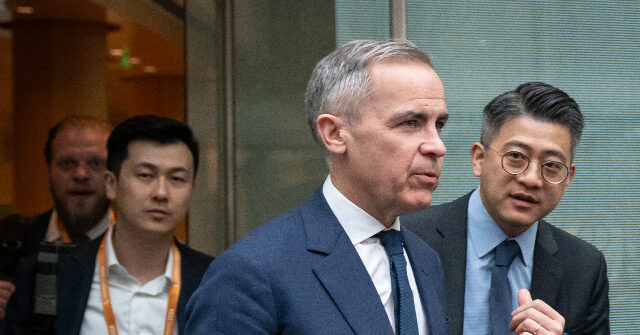Leftist Canadian Prime Minister Mark Carney, who was installed after an internal Liberal Party election in March, “expressed strong confidence in the development prospects and growth potential of investing in China” during a visit to Beijing in October, Canadian outlets recalled this week.
The Chinese government summary of his visit to Beijing while serving as an economic adviser to pro-China leftist predecessor Justin Trudeau followed multiple revelations suggesting Carney’s relationship with the Chinese Communist Party and its ideology is dangerous close, including his refusal to drop a Liberal Party candidate who called for citizens to capture anti-communist dissidents for a Chinese “bounty” and the securing of a sweetheart loan to his former company, Brookfield Asset Management. It is in his capacity as chairman of Brookfield that Carney visited Beijing and met with its mayor, Yin Yong, in October.
Carney is currently in a cutthroat race to keep his appointed prime ministership in an election scheduled for April 28. His most formidable opponent, Conservative Party leader Pierre Poilievre, argued on Wednesday that Carney was “compromised by the authoritarian regime in Beijing” – a grave accusation following multiple reports that Canadian intelligence officials have uncovered Chinese regime operations to interfere in Canadian elections.
The Canadian outlet Blacklock’s Reporter reported on Tuesday, citing the anti-communist Epoch Times, that Carney “lobbied” the mayor of Beijing during his visit in October. Both reports were based on an article in the Chinese state outlet Beijing Daily published on October 23, 3024, on Yin’s meetings with Carney and the vice chairman of BlackRock, Philipp Hildebrand. The two men were in Beijing to attend the “Annual Conference of Financial Street Forum.”
“Yin encouraged Brookfield Asset Management and BlackRock to seize opportunities, tap into their strengths, and increase their investment and business presence in Beijing,” Beijing Daily reported. “He invited both companies to further deepen mutually beneficial cooperation, and share the dividends of Beijing’s high-quality development and high-standard opening-up.”
“Both foreign guests expressed strong confidence in the development prospects and growth potential of investing in China,” the report continued.
Carney, it claimed, personally “highlighted Brookfield Asset Management’s keen interest in seizing development opportunities in China, further expanding its business in Beijing, and deepening cooperation with relevant partners in areas such as green finance, fund management, and infrastructure investment.”
A month after Carney’s visit to Beijing, in November, Brookfield secured a a $276 million 15-year loan with four percent interest, a greatly beneficial deal to the asset manager that Conservatives described as a “sweetheart” agreement.
Carney’s visit to China and the massive Brookfield loan occurred after Carney became an official part of the Trudeau government. As the National Post recalled this week, Trudeau offered Carney a job as the leader of a Liberal Party “task force on economic growth.” Carney had previously advised Trudeau on his disastrous response to the Wuhan coronavirus pandemic and on green energy.
Poilievre condemned Carney’s relationship with China on Wednesday, describing him as “compromised.”
“His company owes the Chinese state-owned bank a quarter billion dollars. He protected a Liberal candidate & MP who said a Canadian citizen should be turned over to Beijing for a bounty,” Poilievre noted. “And now we find out he lobbied the Chinese government weeks before becoming PM to ‘deepen co-operation.’ The Carney Liberals can’t be trusted to keep Canadians safe. They don’t deserve a fourth term.”
The “bounty” comment concerned the scandal emerging this week surrounding member of Parliament and now-former Liberal Party candidate Paul Chiang. In January, Chiang had suggested to Chinese-language media that individuals should attempt to abduct his opponent, anti-communist activist Joe Tay, to receive a bounty from the Chinese government.
“If anyone here can take [Tay] to the Chinese Consulate General in Toronto, you can get the million-dollar reward,” Chiang said.
When the comments emerged in Anglophone media in late March, Carney mildly condemned them but refused to call for Chiang to step down, calling the scandal a “teachable moment.”
“He’s made his apology. He’s made it to the public, he’s made it to the individual concerned, he’s made it directly to me, and he’s going to continue with his candidacy,” Carney said. “He has my confidence.”
Chiang stepped down anyway on March 31.
Brookfield Asset Management is an international company that first invested in China in 2013. According to the website of its Chinese office, it has invested heavily in green energy in China as well as the country’s floundering real estate market.
“We have continued to invest in assets that form the backbone of China’s economy across critical industries including logistics, retail, energy and business services,” Brookfield said of itself.
Bloomberg News highlighted Brookfield as a company bucking the trend of Western investors fleeing the decaying post-lockdown Chinese economy in May.
“There are many global investors that are not interested in China anymore, but there a lot that are,” Brookfield Chief Executive Officer Bruce Flatt said at a panel in Qatar that month, as quoted by Bloomberg. “The local investors have money in China and are doubling down on investing in China.”
Follow Frances Martel on Facebook and Twitter.
Read the full article here


